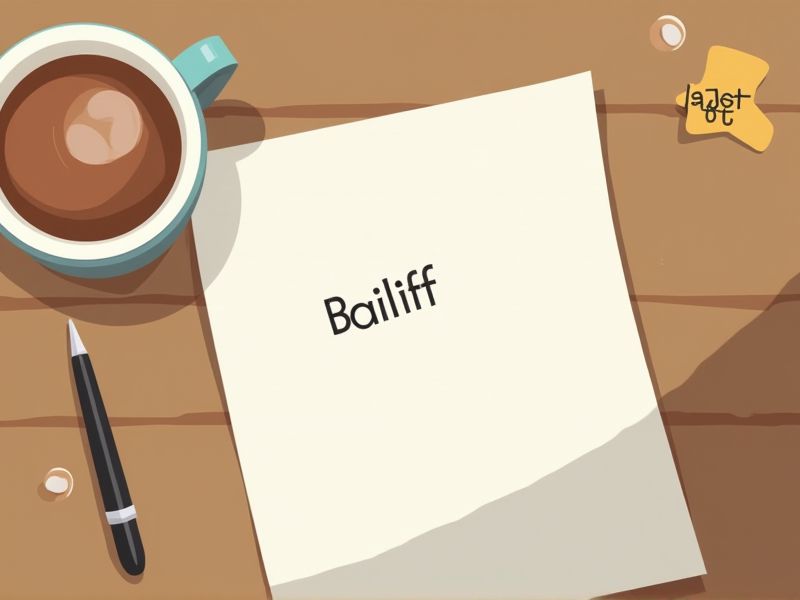
Bailiffs play a critical role in enforcing court orders, demanding a solid understanding of legal procedures and ethical standards. Without specific certifications, bailiffs may lack crucial training in conflict management and asset recovery, compromising the integrity and efficacy of their position. Certifications ensure bailiffs are proficient in handling sensitive legal documents and maintaining public safety during evictions or repossessions. Some vital certifications you may require as a bailiff are listed here.
Bailiff Training Certification
Bailiff Training Certification ensures that bailiffs are equipped with the necessary skills and knowledge to maintain courtroom security and order effectively. Certification provides a standardized benchmark for evaluating a bailiff's ability to manage high-tension situations and de-escalate conflicts. The training emphasizes the importance of legal and procedural compliance, reducing the risk of errors and legal challenges in court proceedings. Certified bailiffs demonstrate enhanced professional credibility and reduce institutional liability by adhering to best practices.
Courtroom Security Certification
The need for Courtroom Security Certification for bailiffs arises from the need to ensure the safety and order within judicial environments. Proper certification equips bailiffs with the skills and protocols necessary to respond to potential threats, minimizing risk to all parties involved in court proceedings. A certified bailiff is likely to possess a comprehensive understanding of legal and emergency procedures, which is crucial in maintaining courtroom integrity. Certification also ensures standardization in security practices across different courts, promoting consistency and reliability in the justice system.
First Aid/CPR Certification
Bailiffs often work in environments where unexpected medical emergencies may arise among the public or courtroom personnel. Having First Aid/CPR certification equips them with the necessary skills to stabilize individuals until professional medical help arrives. This capability enhances the safety and security of the court environment, where immediate medical intervention can be critical. Certification also aligns with legal obligations and standards for ensuring public welfare in official settings.
Conflict Resolution Certification
Bailiffs often work in environments where disputes and tensions can arise, requiring skills to handle situations calmly. A Conflict Resolution Certification equips bailiffs with strategies to de-escalate potentially volatile scenarios, reducing the likelihood of escalation. Knowledge from such certification improves communication effectiveness, ensuring clearer instructions and compliance. Trained in conflict resolution, bailiffs can fulfill their duties while minimizing physical confrontations, enhancing overall safety.
Defensive Tactics Certification
Defensive Tactics Certification equips bailiffs with essential skills to manage potentially violent situations in courtrooms. Training reduces the risk of harm to both the bailiff and the public by teaching appropriate use-of-force techniques. Certification ensures that bailiffs remain up-to-date with legal standards and safety protocols. Mastery in defensive tactics instills public confidence in courtroom security procedures.
Crisis Intervention Certification
Crisis intervention certification equips bailiffs with essential skills to manage high-stress situations safely within courtroom environments. Training focuses on de-escalation techniques, reducing the risk of violence and ensuring the protection of all participants. Understanding mental health issues through certification helps bailiffs identify and respond appropriately to individuals in crisis. Certification enhances public trust and confidence in the legal system by promoting a safer and more controlled courtroom atmosphere.
Legal Procedures Certification
The Legal Procedures Certification ensures bailiffs understand and adhere to the legal framework and procedures essential for their duties. This certification provides credibility and validation of a bailiff's knowledge in enforcing court orders ethically and lawfully. Adequate training through certification minimizes the risk of procedural errors that could lead to legal challenges or disputes. Certification aligns bailiffs with updated regulations, enhancing consistency and public trust in legal enforcement activities.
Communication and De-escalation Certification
Bailiffs regularly encounter high-tension situations, and communication and de-escalation certification equips them to defuse potential conflicts. Proper training ensures they can effectively manage interactions with individuals in distress, reducing the likelihood of physical confrontations. This certification enhances their ability to maintain courtroom order while prioritizing safety for all parties involved. Organizations also see a reduction in liability risks when bailiffs are trained in these essential skills.
Emergency Response Certification
Bailiffs often encounter volatile situations in courtrooms, where having emergency response certification enables them to effectively manage sudden conflicts or medical emergencies. This certification equips them with skills to assess and respond to unexpected incidents, ensuring the safety of both court personnel and the public. Knowledge in emergency response enhances a bailiff's ability to handle stress and make informed decisions during high-pressure situations. Court environments can quickly escalate, and trained bailiffs contribute to maintaining order and minimizing potential risks.
Ethics in Law Enforcement Certification
Ethics in Law Enforcement Certification for bailiffs helps ensure they uphold the law with integrity, reducing the risk of corruption or abuse of power. This certification provides bailiffs with the necessary guidelines and standards in professional conduct, promoting trust within the judicial system. Training in ethical principles aids bailiffs in making impartial decisions, which is crucial for maintaining courtroom decorum. Certification requirements often lead to increased accountability, encouraging transparency and fairness in their duties.
Summary
When you pursue certifications as a bailiff, your skills and knowledge become more refined, enhancing your professional credibility. This credentialing often increases your employability, as courts and legal institutions prefer certified professionals. As you gain recognition, you may receive opportunities for career advancement or potential salary increases. Certifications can also foster competency in handling challenging situations, leading to improved performance in courtroom management.
